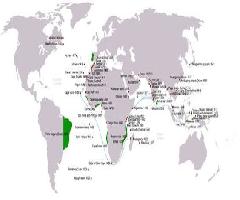At its height the Mughal Empire was amongst the most powerful states on the globe. It had significant achievements to boast about, culturally as well as economically. Their territories were tempting to foreign armies and companies alike.
However the Mughals lost their empire and their power, long before its formal abolition in 1858. That was some five or six decades after all real authority had gone to others. The factors that brought about such a stark decline in fortune were varied, and with differing degrees of importance.
The Mughals had established their empire in 1526, and at that point its Muslim rulers
were careful not to alienate their numerically superior Hindu subjects and their commercially invaluable Sikh population. The Mughals to begin with ruled with a high degree of religious toleration. Their subjects thus paid their taxes, and gave loyal military service when required.When they ignored the Hindus and Sikhs within their empire it had an adverse affect upon the stability of their state. Ill considered policies prompted a series of ever increasingly dangerous Hindu and Sikh rebellions that weakened government authority. These risings often coincided with, or followed foreign intervention.
Another factor that weakened the Mughal Empire was its declining income. Imperial revenues fell for a variety of reasons. Income fell
because less people paid their taxes, and because parts of the empire were lost, ether completely, or by proxy as foreign companies especially the East India Company run from London took over the collection of taxes. The later emperors could not afford wars against enemies such as Persia, or to regain control of its assets from the British.Foreign intervention was probably the most important factor in the decline of the Mughals. The rot had set in markedly after a very unsuccessful war against the Persians. Instead of gaining territories the Mughals were weakened when Delhi was briefly captured with heavy loss of life in 1739. The British and French fought each other as well as the Mughals plus other Indian rulers to gain control over the declining empire. The victories of the East India Company meant that it effectively ruled the Mughal territories by 1806. The Mughals plotted to regain power but the failure of the Indian Mutiny sealed their formal demise.
Bibliography
Brazier C (2006) The No Nonsense Guide to World History
Lenman B (2004) Chambers Dictionary of World History
Woodruff W (2005) A Concise history of the Modern World
